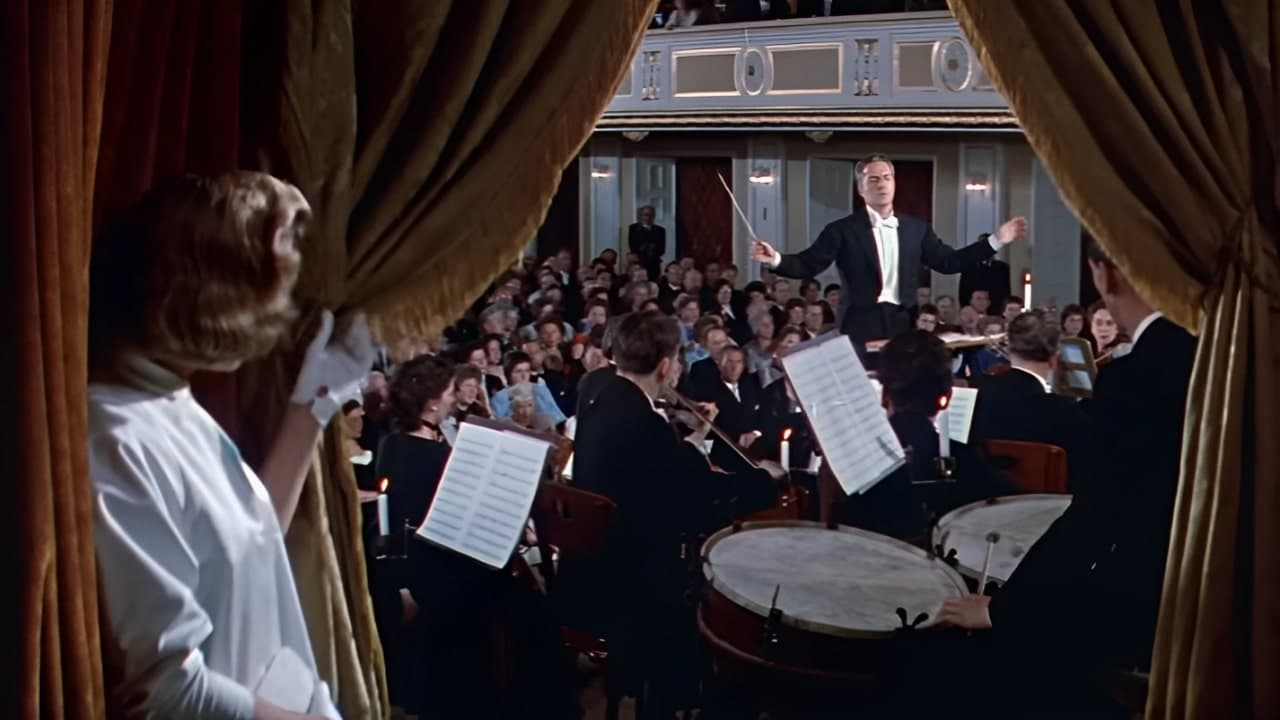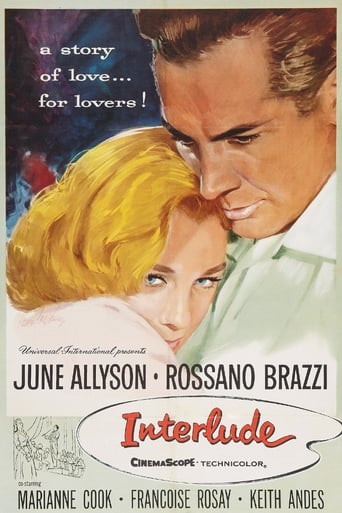

Our only reason for watching this film was because of Douglas Sirk. The director specialized in this type of melodrama, creating extraordinary films. This offering is based on a James Cain story that appears to have been recycled to fit June Allyson's contract, which was about to expire. The fact Mr. Sirk was not too fond of this particular film, speaks volumes about why it did not jelled after all. The project had the right elements, but something did not go right in spite of having the great William Daniels as the cinematographer. In fact, this film reminds this viewer of a much better one, "Summertime" which dealt more or less with the same theme, and both had the presence of Rossano Brazzi.The story has been told in different variations before. The somewhat naive American young woman goes to the postwar Europe finds love and romance, but mighty forces come between herself and the hunky conductor who was having his own problems with a sick wife. We all realize ;how the story is going to evolve because the best qualities of the unselfish Helen Banning will do the only decent thing she could do to make things all right for Tonio Fischer.June Allyson was approaching forty when this film went into production. She always cast such a bland presence in her movies that her character is not helped by her approach. Rossano Brazzi, on the other hand, does a wonderful job as Tonio, although it is obvious there was no chemistry between him and Ms. Allyson. For all practical purposes, the film plays like a travelogue showing parts of Germany and Austria in beautiful colors thanks to Mr. Daniels.
... View MoreA propos of "when tomorrow comes" ,of which "interlude" is the remake: This is not one of Stahl's best works.The movie lacks a center of gravity. Melodrama interferes with social topics(unions,strikes,meetings)and even a deluge,complete with a night in a temple.Besides,the Madeleine character appears too late and is hardly credible.She suffers from mental illness since she lost her child.And the unfortunate heroine tells her so:"you win because you're helpless". Charles Boyer plays the usual Latin lover,and Irene Dunne,the impossible love ,as she did in Fannie Hurst's famous tear-jerker. The ending is ambiguous:in his 1957 remake,the by now usual Sirk remake has a more definitive conclusion. All in all,watchable,because of the cast ,but not a great Stahl. A propos of "interlude" : Generally Sirk used to work wonders with his remakes of John M Stahl: "magnificent obsession" and 'imitation of life" (in spite of some reservations for the latter) were ,in several respects ,superior to the thirties works ;"interlude" ,on the other hand ,is less interesting than the original,which was not a masterpiece either.Gone are the social concern,the hurricane and the flood -replaced by a little storm- We're left with an old maid (June Allyson whose performance is mediocre and no romantic at all )two suitors (an Italian buck and a handsome American physician ),plus a depressive woman ,which makes some of the final scenes look like an updated Jane Eyre .It's extraordinary that this bland soap opera should precede ,in Sirk 's filmography ,his absolute masterpiece " a time to love and a time to die" which cannot be praised too highly: one finds it hard to believe that the two movies were made by the same director.French users will notice the presence of Françoise Rosay as the housekeeper.
... View MoreI have to say that I wasn’t all that looking forward to this romantic melodrama – in view of the fact that it bore the triple threat of classical music, travelogue aspects and a syrupy leading lady in June Allyson! However, director Sirk’s typically glossy handling smooths over much that is icky within this type of film; furthermore, male lead Rossano Brazzi is well-cast as the brooding conductor with a mad wife (Marianne Koch, from A FISTFUL OF DOLLARS [1964]!) – looked after by sympathetic aristocratic relative Francoise Rosay – who tries to console himself with ingénue Allyson (she’s unaware of this set-up, while being herself pursued by doctor/childhood friend Keith Andes). Actually, it’s this element – redolent of “Jane Eyre” – which gives the film its substance; interestingly, while Koch’s character only really emerges during the second half, she’s given a couple of powerful/moving confrontation scenes with Allyson (who even saves her from suicide at one point).INTERLUDE (a remake, as were a number of Sirk’s famed Ross Hunter collaborations, of the Oscar-winning WHEN TOMORROW COMES [1939] – based on a story by, of all people, thriller expert James M. Cain!) doesn’t wholly escape cliché, however: while initially gruff towards the heroine, Brazzi then tells Allyson he had noticed her immediately and, to make amends, takes the girl sightseeing (the film naturally makes the most of its attractive European locations) and, later, after a romantic picnic is disrupted by a thunderstorm, the couple get to spend the night in a cottage of his conveniently situated nearby. Other resistible ingredients are Jane Wyatt’s mercifully brief appearance as Allyson’s eccentric superior at work (a library within the American Embassy in Monaco), the way most patrons are seen gushing at Brazzi’s talent (he’s merely a conductor, for cryin’ out loud, not a composer or a musical performer!) and, of course, the obligatory title song. By the way, this old-fashioned plot would turn up on the screen yet again – in Britain but under the same title – in 1968 and that version has the benefit of an intriguing cast (Oskar Werner, Donald Sutherland, John Cleese and Derek Jacobi)!
... View MoreAs soon as Douglas Sirk's "Interlude" opened to a theme sung by the MacGuire Sisters, I knew that we were not in typical Sirk territory anymore. Usually, the pairing of director Sirk and producer Ross Hunter brought forth brooding melodrama and biting social commentary. However, somewhere here things go sour. June Allyson fails in her efforts to bring epic emotion to the screen and the entire film lacks any real sense of heart and soul. The romantic leading man, Rossano Brazzi, thankfully brings some continental sophistication and feeling to the proceedings. But nothing really saves this movie from becoming a flaccid piece of 1950s celluloid.Allyson stars as an American visiting Munich, Germany. She happens to meet a bad-tempered conductor(Brazzi), with an even more poorly-tempered wife. His wife suffers from mental illness which drives Brazzi away from her and into Allyson's arms. Allyson, meanwhile, is also being courted by an American doctor without all of the extra baggage. Allyson is torn between the two men and must make a decision before she heads back home to the U.S.June Allyson was a poor choice as a leading lady for Sirk. Any number of his other female stars would have been great for the role. But, Allyson? I just don't get it. Besides that, she and Brazzi have absolutely no chemistry. There is not one moment in the film where I wanted to see them end up together. The highlights of this film are the lovely scenes shot against the backdrop of a post-war Europe. Also of note for Sirk fans is the heavy use of reflective surfaces and shadows - common imagery in Sirk movies. In the end, however, Sirk, Hunter and the music of Frank Skinner fail to produce anything of substance. Forgettable and slightly disappointing. The 1968 British version of "Interlude" is far superior and highly recommended.
... View More